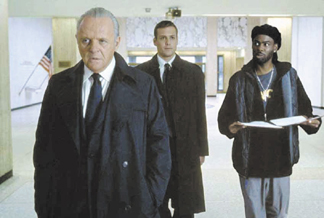Bad Company Indeed
Trite story + banal dialogue = Bad movie
By Rachel Deahl

We gotta ask too, Chris. Who's the other white guy?
For a film that envisions its point of differentiation as its casting, even this element of Jerry Bruckheimer's newest blockbuster is shockingly unoriginal and tired. Bruckheimer's latest foray into spy gaming pairs a wily, smart-talking Chris Rock with an uptight, elder statesman-type in the form of Anthony Hopkins. And, even if the pairing of a young up-and-coming black comedian with an older, celebrated white actor was an interesting and new idea in and of itself (which it is not), the chemistry between Rock and Hopkins pales in comparison to the duo that preceded them: Will Smith and Tommy Lee Jones. A poor man's Men in Black in virtually every way, from its novelty casting on through its idiotic plot about saving the world, Bad Company lacks both a sense of humor and an excuse for its existence.
With its high-concept casting and low-concept script, Bad Company draws the kind of expectations that most studio-driven affairs warrant. Nonetheless, even with lowered expectations, Bruckheimer's egregiously underwhelming film smacks of wasted money and time. From its laughable plot (Rock's twin brother spy, whom he never knew existed, is killed and the ticket scalper is called in by the CIA to take his place) to its blasé one-liners to its rote explosions, everything in Bad Company feels as if it's been timed and lifted from another movie. This isn't filmmaking; it's recycling.
The irony with Bad Company is that it doesn't see itself entirely as a comedy or a satire. Taking into account such plot elements as the twin-brother-switch to the finale bomb diffusion, it appears as if this script was meant to be a spoof of spy movies. No such luck. So familiar and stupid are the elements here that I had to constantly remind myself this was not indeed an SNL sketch.
Even Rock's presence is disappointing. A brilliant comedian, Rock is limited by the awful script; his humor is kept to a few jokes about how white Anthony Hopkins is and how uptight the CIA seems to be. And, Hopkins, who must be determined to undermine any credibility he once possessed as an actor by appearing in any film that dangles a paycheck in front of his face, is particularly droll. Hopkins might be more palatable if he actually attempted to do some acting; Bad Company reinforces the feeling that Hopkins needs to stop playing himself and start working on his characters. And, as for the chemistry between its two principles, this film proves that, just because you put two people in the same frame doesn't mean they gel.
The existence of a film like Bad Company wouldn't be so bothersome were it not for the devastating knowledge of how much it cost (which is many, many millions). And, while it's a widely accepted fact that mindless and expensive films are the norm in Hollywood, watching films like this always makes that reality sting a bit more.